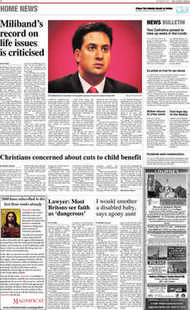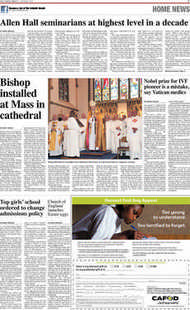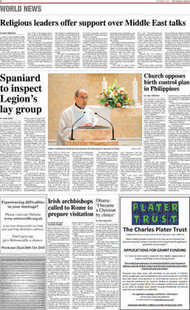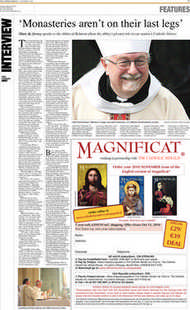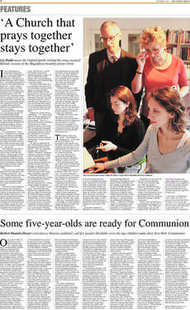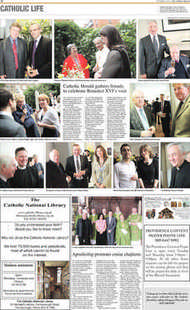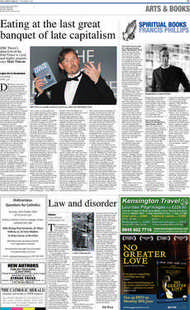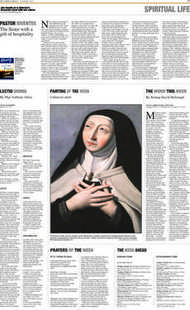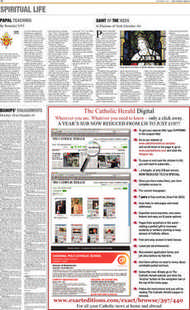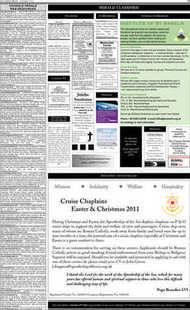Page 9, 8th October 2010
Page 9

Report an error
Noticed an error on this page?If you've noticed an error in this article please click here to report it.
Tags
Share
Related articles
The West Cannot Turn Muslims Into Nice Liberals
The Outlook Of The "catholic Herald"
Christ The King And Party Politics
Weightlifters On Ice Rinks
To Be Or Not To Be Catholic
The End Of The Talking Shop
The Church gave the world secularism
Jerome di Costanzo says it’s time or Catholics to reclaim the word rom aggressive atheists
The word “secular” means “of the age” and properly it is what is ruled by time as opposed to what is eternal. I am not very convinced that our modern secularists like to hear this or understand it as I do as a Catholic. Just the word “secularisation” is enough to inspire panic in the average parishioner, but I would describe myself as a proper secularist.
A separation of the state and the Church has always existed in the Judaeo-Christian tradition. In the Old Testament Moses asked Joshua to lead the men to fight the Amalekites because the prophet had to stay away from any fighting. In the Gospel of Matthew, Christ said: “Render unto Caesar the things which are Caesar’s, and unto God the things that are God’s.” And in Luke Gospel’s he said: “My kingdom is not of this world.” And not just in the scriptures, but all along the Church’s history the list of martyrs and saints is witness to this separation: St Thomas Beckett and St Thomas More, or Edmund Campion. (Remember that Guy Fawkes is neither Blessed or beatified.) St Augustine of Hippo and after him Thomas Aquinas made it clear that logic and reason preside in matters of politics.
Divine right appeared in the second part of the 16th century with the jurist Jean Bodin; ultramontanism came from a postFrench Revolution reactionary philosophy from the first part of the 19th century. Both of these doctrines mainly emerged from a particular context, and are not from direct canonical inspiration. Secularity wasn’t discovered during the Enlightenment, but is a constant question in the western world and, more than that, it characterises its culture. The Church doesn’t oppose secularity. It is, in fact, its origin.
As a Catholic I’m a secularist and I find it difficult to understand the self-styled secularists and their purpose. The National Secular Society (NSS) in its definition of secularism has skipped all reference to Christianity or other religious connotations. They refer to the French laïcité, not atheism; fair enough. In its page on definitions the NSS says: “The French Republic has always recognised individuals, rather than groups: a French citizen owes allegiance to the nation, and has no officially sanctioned ethnic or religious identity. This view of citizenship is fundamentally nondiscriminatory and inclusive.” But it could be said that laicity’s modern understanding is in relation to Galatians 3:28: “There is neither Jew nor Greek, slave nor free, male nor female, for you are all one in Christ Jesus.” So, here too we can’t avoid or “skip”’ Christian references.
This sense of “where we come from” is so important in politics and legal affairs, because it gives them logical legitimacy. I fear that our “skippist” secularists are illustrating the words of Chesterton: “The modern world is full of the old Christian virtues gone mad. The virtues have gone mad because they have been isolated from each other and are wandering alone.” Gone mad? When Government Minister Lynne Featherstone indicated, with Christian charitable intentions, that homosexual couples could be allowed to marry in traditional religious ceremonies for the first time, we can say that she was crossing the border of her jurisdiction. Or gone absurd? The decision of the European Court of Justice to take the crucifix away from the walls of an Italian school was a rejection of the separation between state and church. It demonstrates that a court of justice completely disregarded why the object was placed on the wall. It was there because it marked a legal agreement between the Italian state and the Catholic Church. This agreement – the Concordat – clearly expresses the separation between the politic and the religious.
If the real goal of secularists is separation between the political and the religious, then, yes, it’s a done deal. So their crusade is irrelevant. The proper question today in this debate about secularity is to know if human rights can still be legitimate and viable without being connected to natural law. The examples above implicitly pose that question. Should human rights be reduced to a common rule of life, which can be changed pragmatically according to necessity and excluding natural law – rights, isolated and wandering alone, according to the mood of the moment?
Pope Benedict summarised this reflection between secularity and natural law in reaction to the sexual orientation regulation, which forced the closure of Catholic adoption agencies. At Westminster Hall, he said: “Your country is well-known for its firm commitment to equality of opportunity for all members of society. Yet... the effect of some of the legislation designed to achieve this goal has been to impose unjust limitations on the freedom of religious communities to act in accordance with their beliefs. In some respects it actually violates the natural law upon which the equality of all human beings is grounded and by which it is guaranteed.” I believe that secularists actually want a reconsideration of the prerogatives of the moral and ethical teaching of the Church. They call these privileges, but I call them religious freedoms, because they have been legally agreed between state and Church.
Secularism might be tempted to see itself as above the religious and so itself become state religion, an absolutism. On Facebook, in the category religious view, we are starting to see people choose the label “secularist”. In his book Law of God: The Philosophical History of an Idea, the French philosopher Rémi Brague observes that the French Revolution declared some rights unassailable and sacred, like property rights. It is ironic to see that the notion of the sacred is used for national goods, and this coming from a process of secularisation.
David Pollock, the President of the European Humanist Federation, wrote an article for the Guardian headlined “The Onward March of Secularism” – which sounds to me like a Victorian vicar’s rhetoric. The by-product of secularisation, perhaps, is sacredisation. This contradiction is where “isolated” secularism could fail. Secularism must accept its roots. If not, it is no more than an ecstatic vision.
Jerome di Costanzo is a French analyst and journalist now living in Yorkshire. He specialises in politics, religion and philosophy. He is also a contributor to The Salisbury Review and openDemocracy
blog comments powered by Disqus



